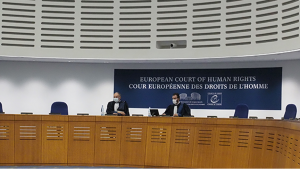By: Hannah Gavin
Impunity Watch Staff Writer
STRASBOURG, France – On October 15, 2020, the European Court of Human Rights came to a final judgment in the case of Muhammad and Muhammad v. Romania. The court found that Romania had violated the plaintiff’s rights in concealing information pertaining to their deportation status.

Adeel Muhammad and Ramzan Muhammad are Pakistani nationals who originally came to Romania on student visas. Both men attended university until December of 2012. At that time, the SRI provided classified documents to the prosecutor’s office who then proceeded to submit an application to the Bucharest Court of Appeals. This application requested that the men two men be deemed “undesirable in Romania”. The prosecutor’s office claimed in the report that the classified information implied that the men were threats to national security. That evening, on December 4th, the local police summoned both Adeel and Ramzan to appear in court the following day.
At the judgment, the prosecutor’s office asked the court to rule that the men were undesirable on the grounds that they had engaged in behaviors that threatened national security. They again referred to the classified documents in their possession. The men informed the court that they had no understanding of why they had been summoned and that the initial application contained only references of legal provisions that were of no specificity to them. The Court of Appeals found both men to be undesirable for the next 15-years in Romania, meaning they were not able to be in the country for that time. The men were then set to be deported.
On Adeel and Ramzan’s initial appeal they were dismissed. The High Court of Cassation viewed the reluctance to expose the classified documents as proper. They stated that the men had “been in a position to know…the reason why they had been summoned to court in the exclusion and expulsion proceedings.” The men appealed again, stating that they were not given their right to effective counsel due to the court not releasing the details of the classified documents.
On the appeal to the European Court of Human Rights, the court sent the case to the Grand Chamber. There the Chamber attempted to determine whether or not the limitations on the information given to the men were proper and if they were necessary as a safeguard. The Chamber found that there was no law in place that clearly established the need for the court to impose non-disclosure. Additionally, the court had not explained the reasons for withholding the information that was concrete. Finally, SRI published a press-release that contained details of the classified information only one day after the judgment.
The Chamber ruled that Romania had violated Article 1 of Protocol no. 7 of the European Convention on Human Rights which allows those facing deportation to have information so that they may provide a reasonable defense. The court found that Romania must pay each of the men EUR 10,000 in damages and another EUR 1,365 for costs and expenses.
For further information, please see: